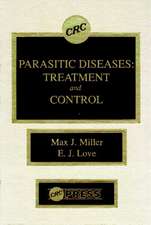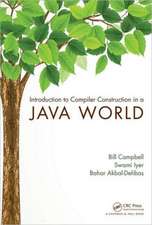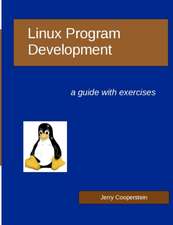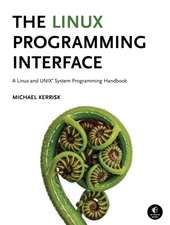Linux Kernel Development: Developer's Library
Autor Robert Loveen Limba Engleză Paperback – 21 iun 2010
Linux Kernel Development details the design and implementation of the Linux kernel, presenting the content in a manner that is beneficial to those writing and developing kernel code, as well as to programmers seeking to better understand the operating system and become more efficient and productive in their coding.
¿
The book details the major subsystems and features of the Linux kernel, including its design, implementation, and interfaces. It covers the Linux kernel with both a practical and theoretical eye, which should appeal to readers with a variety of interests and needs.
¿
The author, a core kernel developer, shares valuable knowledge and experience on the 2.6 Linux kernel. Specific topics covered include process management, scheduling, time management and timers, the system call interface, memory addressing, memory management, the page cache, the VFS, kernel synchronization, portability concerns, and debugging techniques. This book covers the most interesting features of the Linux 2.6 kernel, including the CFS scheduler, preemptive kernel, block I/O layer, and I/O schedulers.
Preț: 249.11 lei
Preț vechi: 311.39 lei
-20% Nou
47.67€ • 49.77$ • 39.45£
Carte disponibilă
Livrare economică 14-28 martie
Livrare express 27 februarie-05 martie pentru 43.16 lei
Specificații
ISBN-10: 0672329468
Pagini: 440
Dimensiuni: 179 x 231 x 30 mm
Greutate: 0.78 kg
Ediția:Nouă
Editura: Addison-Wesley Professional
Seria Developer's Library
Locul publicării:Boston, United States
Descriere
The book details the major subsystems and features of the Linux kernel, including its design, implementation, and interfaces. It covers the Linux kernel with both a practical and theoretical eye, which should appeal to readers with a variety of interests and needs.
The author, a core kernel developer, shares valuable knowledge and experience on the 2.6 Linux kernel. Specific topics covered include process management, scheduling, time management and timers, the system call interface, memory addressing, memory management, the page cache, the VFS, kernel synchronization, portability concerns, and debugging techniques. This book covers the most interesting features of the Linux 2.6 kernel, including the CFS scheduler, preemptive kernel, block I/O layer, and I/O schedulers.
The third edition of Linux Kernel Development includes new and updated material throughout the book:
- An all-new chapter on kernel data structures
- Details on interrupt handlers and bottom halves
- Extended coverage of virtual memory and memory allocation
- Tips on debugging the Linux kernel
- In-depth coverage of kernel synchronization and locking
- Useful insight into submitting kernel patches and working with the Linux kernel community
Cuprins
2 Getting Started with the Kernel
3 Process Management
4 Process Scheduling
5 System Calls
6 Kernel Data Structures
7 Interrupts and Interrupt Handlers
8 Bottom Halves and Deferring Work
9 An Introduction to Kernel Synchronization
10 Kernel Synchronization Methods
11 Timers and Time Management
12 Memory Management
13 The Virtual Filesystem
14 The Block I/O Layer
15 The Process Address Space
16 The Page Cache and Page Writeback
17 Devices and Modules
18 Debugging
19 Portability
20 Patches, Hacking, and the Community
Notă biografică
¿
Love’s kernel projects include the preemptive kernel, the process scheduler, the kernel events layer, inotify,VM enhancements, and several device drivers.
¿
He has given numerous talks on and has written multiple articles about the Linux kernel and is a contributing editor for Linux Journal. His other books include Linux System Programming and Linux in a Nutshell.
Textul de pe ultima copertă
¿
The book details the major subsystems and features of the Linux kernel, including its design, implementation, and interfaces. It covers the Linux kernel with both a practical and theoretical eye, which should appeal to readers with a variety of interests and needs.
¿
The author, a core kernel developer, shares valuable knowledge and experience on the 2.6 Linux kernel. Specific topics covered include process management, scheduling, time management and timers, the system call interface, memory addressing, memory management, the page cache, the VFS, kernel synchronization, portability concerns, and debugging techniques. This book covers the most interesting features of the Linux 2.6 kernel, including the CFS scheduler, preemptive kernel, block I/O layer, and I/O schedulers.
¿
The third edition of Linux Kernel Development includes new and updated material throughout the book:
- An all-new chapter on kernel data structures
- Details on interrupt handlers and bottom halves
- Extended coverage of virtual memory and memory allocation
- Tips on debugging the Linux kernel
- In-depth coverage of kernel synchronization and locking
- Useful insight into submitting kernel patches and working with the Linux kernel community
Caracteristici
- Authored by a well-known member of the Linux kernel development team with a reputation for a highly readable and focused writing style
- Updated and improved coverage of all the major subsystems and features of the latest version of the Linux 2.6.xx kernel, with new coverage of kernel data structures
- Allows developers to learn how to modify and enhance kernel code by providing examples based on real kernel code
- Details on¿interrupt handlers and bottom halves
- Extended coverage of virtual memory and¿memory allocation
- Information on debugging kernel code
- Examples of kernel synchronization and timers
- Useful insight into submitting kernel patches¿and working with the Linux kernel community
Caracteristici noi
- An all-new chapter on kernel data structures
- Details on interrupt handlers and bottom halves
- Extended coverage of virtual memory and memory allocation
- Information on debugging kernel code
- Examples of kernel synchronization and timers
- Useful insight into submitting kernel patches and working with the Linux kernel community
































